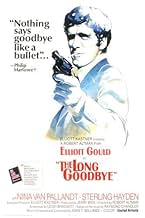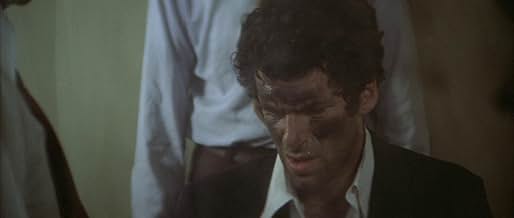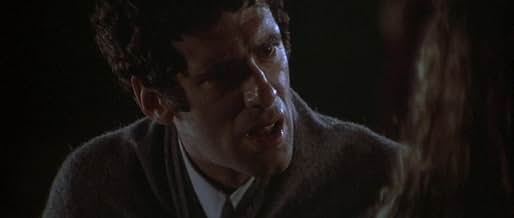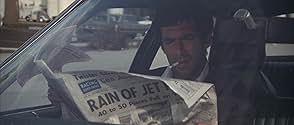निजी जांचकर्ता फिलिप मारलोवे अपने दोस्त को जाम से बाहर निकालने में मदद करता है, लेकिन वहीं पर अपनी पत्नी की हत्या में फंसा दिया जाता है.निजी जांचकर्ता फिलिप मारलोवे अपने दोस्त को जाम से बाहर निकालने में मदद करता है, लेकिन वहीं पर अपनी पत्नी की हत्या में फंसा दिया जाता है.निजी जांचकर्ता फिलिप मारलोवे अपने दोस्त को जाम से बाहर निकालने में मदद करता है, लेकिन वहीं पर अपनी पत्नी की हत्या में फंसा दिया जाता है.
- निर्देशक
- लेखक
- स्टार
- पुरस्कार
- 2 जीत और कुल 1 नामांकन
Stephen Coit
- Detective Farmer
- (as Steve Coit)
Vincent Palmieri
- Vince
- (as Vince Palmieri)
Pancho Córdova
- Doctor
- (as Pancho Cordoba)
फ़ीचर्ड समीक्षाएं
10faraaj-1
It's true. You can't have mixed feelings about The Long Good-bye; you'll either love it or hate it. I started the movie with what I pretended was an open mind, but a secret hope that I'd be fully justified in hating it. In my defense, The Maltese Falcon is my favorite movie and Bogie is my favorite actor. Noir is my favorite film genre and I love Howard Hawk's The Big Sleep wihich had Bogart as the definitive Marlowe.
Altman's take on Chandler's other book with private eye Marlowe, The Long Good-bye, updates the action to the 1970's. He introduces a very 70's theme song and finds as different an actor as he can from Bogart for the role of Marlowe. From the opening frame, Elliot Gould plays Marlowe like a push-over. He's a man who constantly mutters to himself, suffers nervous tics, can't even fool his cat, is afraid of dog's and seems to be the only man not attracted to his sexy hippie neighbors despite their friendliness towards him and obvious promiscuousness.
However, Gould really creates a unique persona with the way he walks, talks, wise-cracks and operates. He becomes a believable person - which is why the uncharacteristic ending is so impacting. The photography, especially the night scenes, are beautifully filmed. The theme music plays everywhere - a Mexican funeral, a doorbell, a car radio etc and with different singers. There are other layers of flesh added to the telling that really work - like the compound security guards impressions of James Stewart, Barbara Stanwyck, Cary Grant and best of all Walter Brennan aka Stumpy from Rio Bravo.
This movie worked great for me and the plot, intricate though it was, was understandable. I will not compare this Marlowe to Bogart's, but do find it admirable that Altman just stuck to the goal of making a good movie without trying to ape or make obvious references to the noir genre.
Altman's take on Chandler's other book with private eye Marlowe, The Long Good-bye, updates the action to the 1970's. He introduces a very 70's theme song and finds as different an actor as he can from Bogart for the role of Marlowe. From the opening frame, Elliot Gould plays Marlowe like a push-over. He's a man who constantly mutters to himself, suffers nervous tics, can't even fool his cat, is afraid of dog's and seems to be the only man not attracted to his sexy hippie neighbors despite their friendliness towards him and obvious promiscuousness.
However, Gould really creates a unique persona with the way he walks, talks, wise-cracks and operates. He becomes a believable person - which is why the uncharacteristic ending is so impacting. The photography, especially the night scenes, are beautifully filmed. The theme music plays everywhere - a Mexican funeral, a doorbell, a car radio etc and with different singers. There are other layers of flesh added to the telling that really work - like the compound security guards impressions of James Stewart, Barbara Stanwyck, Cary Grant and best of all Walter Brennan aka Stumpy from Rio Bravo.
This movie worked great for me and the plot, intricate though it was, was understandable. I will not compare this Marlowe to Bogart's, but do find it admirable that Altman just stuck to the goal of making a good movie without trying to ape or make obvious references to the noir genre.
Usually smoking, and sometimes smirking, Elliott Gould mumbles and stumbles his way through Altman's re-invention of this gumshoe novel by Raymond Chandler. The film's unexpectedly interesting ending suggests a good story, but you'd never know it from the film's plot, which rambles and meanders, seemingly without purpose, a pointless talk-fest wherein Marlowe interacts with the cops, a femme fatale, a buddy who wants to disappear, and assorted hoods and mobsters. It's all rather sordid and seedy as you would expect, except that it's brought up to date, for 1973, and in its "hipness" and sophistication becomes something of a parody of 1940's private-eye flicks. Gould's Marlowe is annoyingly smug, with a too casual manner. And I found none of the other characters to be sympathetic or likable.
The dialogue and the acting are stilted and self-conscious. In one party sequence that takes place on the beach, Dr. Verringer (Henry Gibson) insists that he get his money. The guests stand around, as if they are movie extras brought in for this one day of shooting. The viewer can easily imagine microphones just over the heads of the principal actors, and personnel just off-screen, waiting for Altman to yell: "Cut". Along with other scenes, it looks forced and staged.
The film's best attribute is its cinematography. I especially like the sequence showing human figures retreating into the surf at night. Combined with the sound of ocean waves, it makes for an interesting segment.
Some viewers love this film because of Altman's direction and Gould's performance. Others hate it because it so deviates from Chandler's original story. I personally did not like the film, mostly because of Marlowe, himself, and because of the tangled and convoluted plot, populated by loquacious characters who I found totally not interesting.
The dialogue and the acting are stilted and self-conscious. In one party sequence that takes place on the beach, Dr. Verringer (Henry Gibson) insists that he get his money. The guests stand around, as if they are movie extras brought in for this one day of shooting. The viewer can easily imagine microphones just over the heads of the principal actors, and personnel just off-screen, waiting for Altman to yell: "Cut". Along with other scenes, it looks forced and staged.
The film's best attribute is its cinematography. I especially like the sequence showing human figures retreating into the surf at night. Combined with the sound of ocean waves, it makes for an interesting segment.
Some viewers love this film because of Altman's direction and Gould's performance. Others hate it because it so deviates from Chandler's original story. I personally did not like the film, mostly because of Marlowe, himself, and because of the tangled and convoluted plot, populated by loquacious characters who I found totally not interesting.
Much like the 30's jazz music that opens the movie, The Long Goodbye appears on the surface to take its cue from classic film noir. No surprise here, it is based after all on the Raymond Chandler novel by the same name, Chandler as iconic a figure in the noir realm as you're likely to get and responsible for some of the most distinctly classic moments of the genre (Double Indemnity, The Big Sleep, also Strangers on a Train for Hitchcock). But instead of rehashing styles and themes from a bygone era of film-making, Altman instead takes Chandler's film noir of wandering, and hangs on it his own unique take.
Elliot Gould is Phillip Marlowe. Scruffy, sardonic and alienated private dick with a smart mouth and a cigarette eternally glued to his lips. Altman's twist? He's cool but not the suave kind that would impress dames in the 40's, the Bogart kind. He seems constantly out of place, a bit phased, doomed to observe and comment in his witty repartee on what's going on around him or just let the chips fall where they may. And they do.
Chandler's story is one of his very best. All the staples of noir are present, simultaneously fulfilling the promise of a Phillip Marlowe film and in the same time preparing the ground for Altman's take on it; murder, missing money, unhappy marriages, a private eye hired to investigate. The works. Sprawling and convoluted like the best of noirs usually are. The dialogue crackling with inventiveness, shedding tough guy lingo for a sense of playfulness, rolling in and out of the picture in a stream-of-consciousness way.
Some of the twists and characters seem to carry a sense of seething malice, a fleeting glimpse on the seamy underbelly of the Great American Beast, the scars and ugliness of Hollywood showing behind a faded facade of glamour, an escalating creepiness factor that recalls the later works of David Lynch, predating him by a good number of years as it does. The mousey Dr. Verringe and the whole clinic subplot reminded me of Lost Highway for example.
What really elevates The Long Goodbye in another level is Altman's direction and he has Vilmos Zsigmond with him. This is only my second Altman picture (after McCabe and Mrs. Miller) but 2 hours in his presence were enough to leave an indelible sense that I'm watching the work of a master on top of his craft. Altman's camera is always on the move, slowly panning and floating in and out of the frame, picking up details, guiding the eye but never getting in the middle of the story or screaming for attention. The whole thing has a natural, subdued feel to it, what with the unobtrusive lighting and bleached-out, hazy look; no glitz or glamour here. Only the faded, long-gone impression of it. This is a world we are enmeshed in that surrounds from all sides with hazy reflection.
The Long Goodbye is both a fantastic and somewhat hidden gem of 70's crime cinema and also one of the missing links in the evolution of noir, all the way from Sunset Blvd. to Mullholland Drive. You must visit at some point.
Elliot Gould is Phillip Marlowe. Scruffy, sardonic and alienated private dick with a smart mouth and a cigarette eternally glued to his lips. Altman's twist? He's cool but not the suave kind that would impress dames in the 40's, the Bogart kind. He seems constantly out of place, a bit phased, doomed to observe and comment in his witty repartee on what's going on around him or just let the chips fall where they may. And they do.
Chandler's story is one of his very best. All the staples of noir are present, simultaneously fulfilling the promise of a Phillip Marlowe film and in the same time preparing the ground for Altman's take on it; murder, missing money, unhappy marriages, a private eye hired to investigate. The works. Sprawling and convoluted like the best of noirs usually are. The dialogue crackling with inventiveness, shedding tough guy lingo for a sense of playfulness, rolling in and out of the picture in a stream-of-consciousness way.
Some of the twists and characters seem to carry a sense of seething malice, a fleeting glimpse on the seamy underbelly of the Great American Beast, the scars and ugliness of Hollywood showing behind a faded facade of glamour, an escalating creepiness factor that recalls the later works of David Lynch, predating him by a good number of years as it does. The mousey Dr. Verringe and the whole clinic subplot reminded me of Lost Highway for example.
What really elevates The Long Goodbye in another level is Altman's direction and he has Vilmos Zsigmond with him. This is only my second Altman picture (after McCabe and Mrs. Miller) but 2 hours in his presence were enough to leave an indelible sense that I'm watching the work of a master on top of his craft. Altman's camera is always on the move, slowly panning and floating in and out of the frame, picking up details, guiding the eye but never getting in the middle of the story or screaming for attention. The whole thing has a natural, subdued feel to it, what with the unobtrusive lighting and bleached-out, hazy look; no glitz or glamour here. Only the faded, long-gone impression of it. This is a world we are enmeshed in that surrounds from all sides with hazy reflection.
The Long Goodbye is both a fantastic and somewhat hidden gem of 70's crime cinema and also one of the missing links in the evolution of noir, all the way from Sunset Blvd. to Mullholland Drive. You must visit at some point.
The very embodiment of '70s Hollywood genre revisionism, Robert Altman's film of The Long Goodbye stands as one of his most accessible, wittily misanthropic films, and probably the finest performance of Elliot Gould's career to date.
A warning for Raymond Chandler purists: you probably won't like this film. Altman and screenwriter Leigh Brackett had quite a task in adapting Chandler's second-last novel to the screen, for in it the 'knight errant' Phillip Marlowe comes over more like a prudish sap. Altman and Brackett have streamlined the narrative, removed peripheral characters, and crucially transformed Marlowe into a murkier, more comically ambiguous protagonist.
In Altman's and Gould's hands, Marlowe is laconically relaxed, murmuring, alternately amused and annoyed at the world. Like Chandler's hero, he is an outsider, a spectator, everywhere he goes. Unlike the literary Marlowe, Gould's character seems washed up on the shores of an unfamiliar land, his nobility as crumpled and stale as his suit.
Along for the ride are the archetypal Chandler villains and victims: self-hating celebrities, young wives trapped in loveless marriages, crooked doctors, low-rent psychopathic gangsters, bored cops, flunkies lost out of time. Typically, the milieux Marlowe moves in range from the affluence of the Malibu Colony to the cells of the County Jail. Altman, however, wishes to make a film in and about 1973; the film is shot through with the psychic reverberations of the end of hippiedom and the remoteness of the 'Me Generation'.
Another Altman touch is his openly expressed contempt for Hollywood and its conventions. As if to acknowledge the artificiality of a private detective story in the midst of 1970s Los Angeles, the film is suffused with jokey references to cinema. Bookended with 'Hooray for Hollywood', the film shows gatekeepers impersonating movie stars, characters changing their names for added class, hoods enacting movie clichés simply because that's where they learnt to behave. Even Marlowe himself refers to the artifice when talking to the cops: 'Is this where I'm supposed to say 'What's all this about?' and he says 'Shut up, I ask the questions' ?'
As for the supporting cast, Sterling Hayden shines out as the beleaguered novelist Roger Wade. There is more than a touch of Hemingway in Hayden's bluff, blustering, vulnerable old hack. Baseball champ and sportscaster Jim Bouton is casually mysterious as Marlowe's friend Terry Lennox, Laugh-In alumnus Henry Gibson is suitably greasy as Dr Verringer, actor/director Mark Rydell (best known for 'On Golden Pond') is convincingly chilling as gangster Marty Augustine, and Nina van Pallandt lends a dignified, defiant pathos to her role as Eileen Wade.
Special note must be made of Vilmos Zsigmond's tremendous photography, employing his early 'flashing' style of exposure to lend Los Angeles a suitably sultry, bleached-out aura. Also deserving attention is John Williams' ingeniously minimalist score. Comprised solely of pseudo-source music, the score is a myriad of variations on a single song, appearing here as supermarket muzak, there as a party singalong, elsewhere as a late night radio tune.
The film's controversial ending is utterly antithetical to Chandler's vision. The message from Altman, however, is loud and clear: Chandler's world no longer exists if indeed it ever did.
A warning for Raymond Chandler purists: you probably won't like this film. Altman and screenwriter Leigh Brackett had quite a task in adapting Chandler's second-last novel to the screen, for in it the 'knight errant' Phillip Marlowe comes over more like a prudish sap. Altman and Brackett have streamlined the narrative, removed peripheral characters, and crucially transformed Marlowe into a murkier, more comically ambiguous protagonist.
In Altman's and Gould's hands, Marlowe is laconically relaxed, murmuring, alternately amused and annoyed at the world. Like Chandler's hero, he is an outsider, a spectator, everywhere he goes. Unlike the literary Marlowe, Gould's character seems washed up on the shores of an unfamiliar land, his nobility as crumpled and stale as his suit.
Along for the ride are the archetypal Chandler villains and victims: self-hating celebrities, young wives trapped in loveless marriages, crooked doctors, low-rent psychopathic gangsters, bored cops, flunkies lost out of time. Typically, the milieux Marlowe moves in range from the affluence of the Malibu Colony to the cells of the County Jail. Altman, however, wishes to make a film in and about 1973; the film is shot through with the psychic reverberations of the end of hippiedom and the remoteness of the 'Me Generation'.
Another Altman touch is his openly expressed contempt for Hollywood and its conventions. As if to acknowledge the artificiality of a private detective story in the midst of 1970s Los Angeles, the film is suffused with jokey references to cinema. Bookended with 'Hooray for Hollywood', the film shows gatekeepers impersonating movie stars, characters changing their names for added class, hoods enacting movie clichés simply because that's where they learnt to behave. Even Marlowe himself refers to the artifice when talking to the cops: 'Is this where I'm supposed to say 'What's all this about?' and he says 'Shut up, I ask the questions' ?'
As for the supporting cast, Sterling Hayden shines out as the beleaguered novelist Roger Wade. There is more than a touch of Hemingway in Hayden's bluff, blustering, vulnerable old hack. Baseball champ and sportscaster Jim Bouton is casually mysterious as Marlowe's friend Terry Lennox, Laugh-In alumnus Henry Gibson is suitably greasy as Dr Verringer, actor/director Mark Rydell (best known for 'On Golden Pond') is convincingly chilling as gangster Marty Augustine, and Nina van Pallandt lends a dignified, defiant pathos to her role as Eileen Wade.
Special note must be made of Vilmos Zsigmond's tremendous photography, employing his early 'flashing' style of exposure to lend Los Angeles a suitably sultry, bleached-out aura. Also deserving attention is John Williams' ingeniously minimalist score. Comprised solely of pseudo-source music, the score is a myriad of variations on a single song, appearing here as supermarket muzak, there as a party singalong, elsewhere as a late night radio tune.
The film's controversial ending is utterly antithetical to Chandler's vision. The message from Altman, however, is loud and clear: Chandler's world no longer exists if indeed it ever did.
Private investigator Philip Marlowe is approached by a friend, Terry Lennox, who is in a bit of a jam. Marlowe helps him get to Mexico but the next day his friend's wife turns up dead. The police hold Marlowe but then release him once Terry Lennox is found dead in Mexico - suicide. To the cops it is an open-and-shut case of murder-suicide but Marlowe doesn't believe that to be the case. Marlowe then is hired by the wife of wealthy author Roger Wade to find her husband. The Wades were neighbours of the Lennoxes. A powerful mob boss also leans on him to find the large sum of money Terry Lennox was transporting for him. Could all these events be connected?
Robert Altman directs a movie based on a Raymond Chandler novel, and it's a mixed bag.
Starts off very well with some humorous scenes and dialogue and a fair amount of intrigue. The middle-to-end sections lack focus, however, and, while it is never dull, the movie feels like it is drifting to a lacklustre conclusion. The intrigue just seems to get sucked out of the movie in that segment. In addition, the theme song gets played in just about every situation and in various forms - it gets very irritating, very quickly.
Ends well though, with a good twist and a powerful conclusion.
A new take on Philip Marlowe from Elliott Gould - he is hardly Humphrey Bogart and he's not trying to be. Altman's Philip Marlowe is the dishevelled, anti-social chain-smoking anti-hero rather than the suave, confident hero that Bogart portrayed. For the most part, it works, though at times I wished for the coolness and wise-cracks of Bogie.
Supporting cast are fine. Sterling Hayden is great as the larger-than-life, Ernest Hemingway/John Huston-esque Roger Wade.
Not the Philip Marlowe of the Bogart movies, but it'll do.
Robert Altman directs a movie based on a Raymond Chandler novel, and it's a mixed bag.
Starts off very well with some humorous scenes and dialogue and a fair amount of intrigue. The middle-to-end sections lack focus, however, and, while it is never dull, the movie feels like it is drifting to a lacklustre conclusion. The intrigue just seems to get sucked out of the movie in that segment. In addition, the theme song gets played in just about every situation and in various forms - it gets very irritating, very quickly.
Ends well though, with a good twist and a powerful conclusion.
A new take on Philip Marlowe from Elliott Gould - he is hardly Humphrey Bogart and he's not trying to be. Altman's Philip Marlowe is the dishevelled, anti-social chain-smoking anti-hero rather than the suave, confident hero that Bogart portrayed. For the most part, it works, though at times I wished for the coolness and wise-cracks of Bogie.
Supporting cast are fine. Sterling Hayden is great as the larger-than-life, Ernest Hemingway/John Huston-esque Roger Wade.
Not the Philip Marlowe of the Bogart movies, but it'll do.
क्या आपको पता है
- ट्रिवियाThe location for Roger Wade - Sterling Hayden's home was actually Robert Altman's home at the time.
- गूफ़During the scene where Marlowe is chasing Mrs. Wade in her top-down Mercedes 450 SL convertible, the car goes from having head rests to having no head rests in various shots.
- भाव
Philip Marlowe: Nobody cares but me.
Terry Lennox: Well that's you, Marlowe. You'll never learn, you're a born loser.
Philip Marlowe: Yeah, I even lost my cat.
- कनेक्शनEdited into El adios largos (2013)
- साउंडट्रैकThe Long Goodbye
by John Williams and Johnny Mercer
Performed by The Dave Grusin Trio, Jack Sheldon, Clydie King, Jack Riley, Morgan Ames, Aluminum Band, The Tepoztlan Municipal Band
टॉप पसंद
रेटिंग देने के लिए साइन-इन करें और वैयक्तिकृत सुझावों के लिए वॉचलिस्ट करें
विवरण
- रिलीज़ की तारीख़
- कंट्री ऑफ़ ओरिजिन
- भाषाएं
- इस रूप में भी जाना जाता है
- Un largo adiós
- फ़िल्माने की जगहें
- 2178 High Tower Drive, हॉलीवुड, लॉस एंजेल्स, कैलिफोर्निया, संयुक्त राज्य अमेरिका(Marlowe's residence)
- उत्पादन कंपनियां
- IMDbPro पर और कंपनी क्रेडिट देखें
बॉक्स ऑफ़िस
- बजट
- $17,00,000(अनुमानित)
- दुनिया भर में सकल
- $27,504
इस पेज में योगदान दें
किसी बदलाव का सुझाव दें या अनुपलब्ध कॉन्टेंट जोड़ें


































